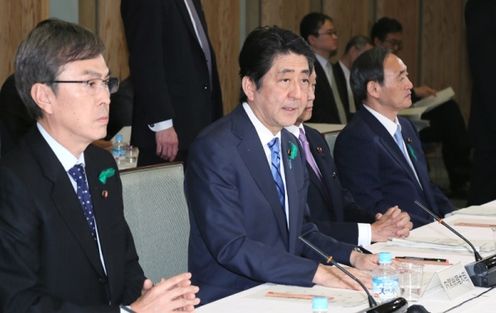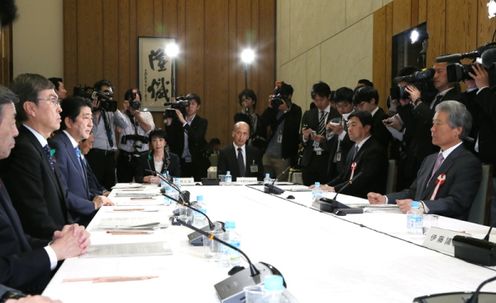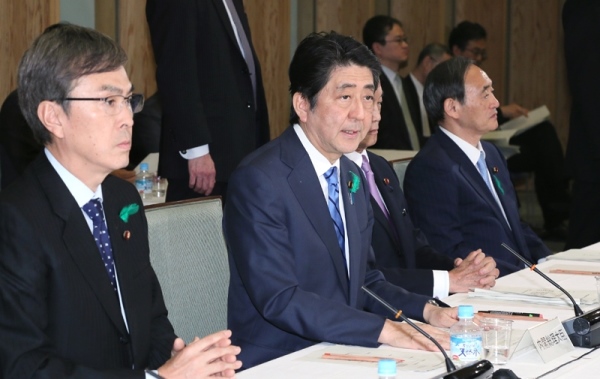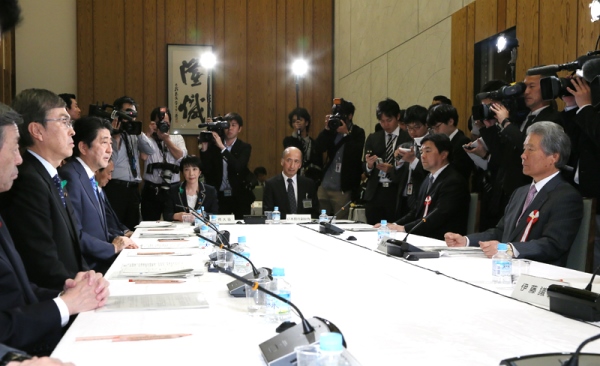Home > News > The Prime Minister in Action > April 2016 > Meeting of the Council on Economic and Fiscal Policy
The Prime Minister in Action
Meeting of the Council on Economic and Fiscal Policy
April 18, 2016

Photograph of the Prime Minister making a statement (1)

Photograph of the Prime Minister making a statement (2)
[Provisional Translation]
Prime Minister Shinzo Abe held the sixth meeting of the Council on Economic and Fiscal Policy in 2016 at the Prime Minister's Office.
At the meeting, there was a discussion on the current situation in the global economy and international collaborations, and preparation for the Basic Policies (using the outcomes of measures to deal with the declining birthrate, women’s active participation, and Abenomics).
Based on the discussion, the Prime Minister said,
“The Kumamoto earthquake of 2016 has caused an extremely significant amount of damage, and forced more than 100,000 people to live in an unsettled manner at evacuation centers or in their vehicles.
It is in times of crisis like this, when we are required to secure necessities like food, water, and undergarments, provide medical goods, repair lifestyle infrastructure, create living environments, and do much more as soon as possible, that the Government and private sector must be united in all-Japan efforts to support the people of Kumamoto, who are undergoing such an anxious experience.
The Government is exerting every effort for that. I request that members of the business community offer cooperation from their own position and take every step that they can to help.
There is just over a month left until the G7 Ise-Shima Summit. Given the increasing lack of transparency in the global economy, the G7 must fulfill its responsibility to lead the global economy to continuous and stronger growth.
The “new three arrows” policies aim to simultaneously improve employment and income conditions and resolve structural issues such as the decline in the working population. We must carefully fine-tune these policies so that we can promote them to the other countries of the G7.
Toward the achievement of a 600 trillion yen economy, I would like the relevant ministers to swiftly flesh out policies so that we can send a clear message on both the stimulation of demand and efforts to increase the latent growth rate.
We have so far advanced steadily with both economic revitalization and fiscal soundness under Abenomics. We must use the outcomes of Abenomics to address structural issues such as the declining population and birthrate that are the root cause of the bottleneck hindering economic growth in Japan.
For the purpose of realizing ‘the positive cycle of growth and distribution,’ I would like Minister Kato to thoroughly incorporate a bold and comprehensive policy package related to marriage, childbirth, and childcare support into the ‘Plan to Realize the Dynamic Engagement of All Citizens.’
Approximately 74% of companies increased their base pay during this year’s spring wage offensive. Research shows this to be a more than 20 point improvement on last year. We are seeing movement toward the improvement of working conditions in a wide range of industries. I believe we can think of this as an expansion of the scope of base pay improvements. In addition, there are expectations that for the first time since we started taking statistics, base pay at small- and medium-sized enterprise (SME) cooperatives in industries like automobiles and electric machinery manufacturing will outpace improvements at major companies. We are seeing an expansion of the number of SMEs and small-scale business operators that are increasing wages.
I would like the business community to continue to make thorough efforts to improve transaction conditions set for small- and medium-sized subcontractors. I would like you to continue to further expand this trend toward higher wages.”


